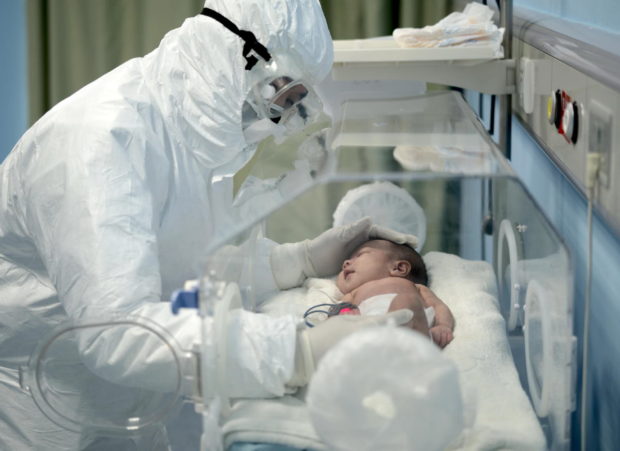
A medical worker looks after a baby with novel coronavirus at Wuhan Children’s Hospital on March 6, 2020. Photo by Du Yufu/China Daily/Asia News Network
WUHAN — When the respiratory disease department at Wuhan Children’s Hospital was transformed to exclusively receive increasing numbers of minors with the novel coronavirus in late January, Wang Yanli and her colleagues felt tension. Like her colleagues, Wang had never worn a protective gown before the outbreak.
“We had no idea what kind of a situation we would face,” said Wang, a doctor in the department. “Will we see critically ill children all over the wards?”
The hospital has since provided Wang and her colleagues with training on protecting themselves and coping with patients with infectious diseases.
Luckily, most of the children in the department were not in serious condition, only displaying symptoms such as fever and mild coughing, Wang said.
“It is not difficult to treat minor patients, but we have to spend more time comforting those parents who worry,” she said.
Over the past six weeks, the hospital has received more than 700 novel coronavirus pneumonia child patients, and more than 600 have been cured and released, according to the hospital.
Due to the infectiousness of the virus, all children are quarantined, so their parents cannot come to look after them, Wang said.
In addition, “for some of the children, their parents are also under quarantine in other hospitals, so many of our staff have been busy looking after them.”
Song Qing, a chief nurse at the department, said many nurses in the department have assumed the role of mothers for the patients.
To care for the children, the department has organized a special nurse team to provide services such as feeding them milk, giving them baths and changing diapers, she said.
“Many of our nurses are very young and unmarried and have had no experience taking care of children,” she said. “In addition, they have to wear thick, protective gowns in the wards, which adds difficulty in providing care.”
To improve care, the nurses, who are unable to meet frequently for fear of cross infection, have been sharing their experiences on social media sites like WeChat, she said.
Because their conditions are mild, some children are active and play with smartphones, paying no attention when medical staff give them directions such as wearing masks, Song said.
“At first, we found it was very difficult for them to obey rules, due to the absence of supervision from their parents,” she said. “We later tried different means, such as helping them with their online homework and playing with them, so they gradually accepted us.”
“I think it is very important to find the best ways to provide health education to children, so they can readily accept it,” she added. “After all, the epidemic is not over, and they have to maintain good health habits such as washing hands frequently after being released from hospital.”
Wang said that with the epidemic easing, the number of hospitalized patients has been decreasing recently, which has greatly relieved the burden on medical staff.
“All the beds in the respiratory department were full until late February,” she said. “The number of new patients has kept declining since the beginning of March.”
Wang also called on parents to take necessary measures to protect their children against the virus, but she said there is no need to be excessively worried if they become infected, as most children will just become mild patients and can be cured.